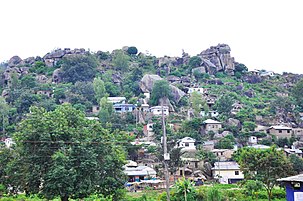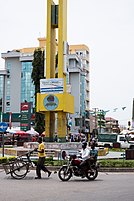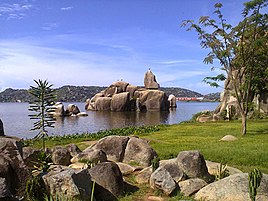Mwanza, Tanzania
Demographics
The Sukuma constitute over 90 percent of the population of the Mwanza Region. Other ethnic groups in the region, in much smaller proportions, include the Zinza, Haya, Sumbwa, Nyamwezi, Luo, Kurya, Jita, Shashi and Kerewe. They live mainly in the Mwanza city area. National policy, however, gives very little importance to ethnic groupings and reliable data is difficult to find.
| Year | Pop. | ±% |
|---|---|---|
| 1978 | 110,553 | — |
| 1988 | 172,287 | +55.8% |
| 2002 | 385,810 | +123.9% |
| 2012 | 706,453 | +83.1% |
| 2022 | 1,104,521 | +56.3% |
| source: | ||
Economy

In 2011 the City Council announced plans to create a major commercial development in the Ilemela District. Construction works on Rock City Mall were finalized in early 2016. This mall is the first of its size in Mwanza and one of the biggest malls in the country.
Tanzania Breweries Limited has a brewery in Mwanza.
Fishing
One major occupation of the inhabitants along the shores of Lake Victoria in Mwanza region is fishing, and there are five fish processing plants in the area. The Nile perch were previously introduced to the lake, and are exported in large quantities.
The consequences of the Nile perch industry are the subject of the Academy Award nominated documentary Darwin's Nightmare (2004) by Hubert Sauper.
Water supply and sanitation
Water supply coverage is at 75% and sewerage at 23.7%. Projects to increase coverage including the UN Habitat Lake Victoria Water and Sanitation (LVWATSAN-Mwanza) project.
Water is managed by the Mwanza Urban Water Supply and Sanitation Authority (Mwauwasa), established in 1996 and wholly owned by the government of Tanzania. The authority covers Mwanza City, Kisesa Township in Magu District, Misungwi town and Nyahiti Village in Misungwi District, Geita, Sengerema and Nansio, and Lamadi in Simiyu Region. Mwauwasa operates a wastewater treatment plant in Butuja Ilemela.
Tourism

National parks
Saanane Island National Park is located on a rocky island in Lake Victoria, 500 meters from Capri Point in the centre of Mwanza.
The westernmost gate (Ndabaka Gate) of Serengeti National Park is located at around 150 kilometres by road from Mwanza town. Day trips to Serengeti National Park are organised by several tour operators in Mwanza.
Rubondo Island National Park can be reached by road and boat, or by a direct flight from Mwanza. It is located around 110 kilometres west of Mwanza town.
Culture
The Sukuma Museum is located in Bujora, just east of Mwanza near Kisesa. It gives an overview of the history, architecture, culture and language of the Sukuma tribe, from which the majority of the native population originates.
Education

St. Augustine University of Tanzania (SAUT) is the main university in Mwanza. The University extends over 600 acres (243 ha) in the Nyegezi-Malimbe area 10 km south of Mwanza City. It lies 4 km off the main Mwanza- Shinyanga road on the south eastern shores of Lake Victoria. The University is a half-hour's drive from Mwanza by car or by bus.
Places of worship
Among the places of worship, they are predominantly Christian churches and temples : Africa Inland Church Tanzania, Roman Catholic Archdiocese of Mwanza (Catholic Church), Anglican Church of Tanzania (Anglican Communion), Evangelical Lutheran Church in Tanzania (Lutheran World Federation), Baptist Convention of Tanzania (Baptist World Alliance), Assemblies of God. There are also Muslim mosques. In the Temple Street, close to each other there are a large Hindu Temple built in the late 50's, one of the first such temples in Tanzania, a Vaishnava Sanatana Mandir, and a BAPS (Swaminarayan) temple - all of them serving the Hindu community.
Climate
Mwanza features a tropical savanna climate under the Köppen climate classification. Temperatures are relatively consistent throughout the course of the year, tempered by the city's altitude. Thus, the climate is not quite as hot as one might expect, given the city's location near the equator. Average temperatures in Mwanza is roughly 23.5 °C (74.3 °F) throughout the year. The city features a lengthy wet season which runs from October through May and a short pronounced dry season that covers the remaining four months. Mwanza receives on average roughly 1,050 millimetres (41 in) of precipitation annually.
| Climate data for Mwanza (1991-2020) | |||||||||||||
|---|---|---|---|---|---|---|---|---|---|---|---|---|---|
| Month | Jan | Feb | Mar | Apr | May | Jun | Jul | Aug | Sep | Oct | Nov | Dec | Year |
| Record high °C (°F) | 35.0 (95.0) |
35.0 (95.0) |
36.6 (97.9) |
34.0 (93.2) |
35.6 (96.1) |
35.0 (95.0) |
34.0 (93.2) |
34.2 (93.6) |
34.5 (94.1) |
36.0 (96.8) |
35.6 (96.1) |
34.2 (93.6) |
36.6 (97.9) |
| Mean daily maximum °C (°F) | 27.8 (82.0) |
28.8 (83.8) |
28.7 (83.7) |
28.5 (83.3) |
28.5 (83.3) |
28.9 (84.0) |
28.9 (84.0) |
29.1 (84.4) |
29.3 (84.7) |
28.9 (84.0) |
27.9 (82.2) |
27.5 (81.5) |
28.6 (83.5) |
| Daily mean °C (°F) | 22.8 (73.0) |
23.3 (73.9) |
23.2 (73.8) |
23.1 (73.6) |
23.2 (73.8) |
22.7 (72.9) |
22.2 (72.0) |
22.6 (72.7) |
23.4 (74.1) |
23.4 (74.1) |
22.9 (73.2) |
22.8 (73.0) |
23.0 (73.3) |
| Mean daily minimum °C (°F) | 18.1 (64.6) |
18.0 (64.4) |
18.2 (64.8) |
18.4 (65.1) |
18.1 (64.6) |
16.5 (61.7) |
15.6 (60.1) |
16.7 (62.1) |
17.7 (63.9) |
18.3 (64.9) |
18.4 (65.1) |
18.3 (64.9) |
17.7 (63.9) |
| Record low °C (°F) | 10.8 (51.4) |
11.0 (51.8) |
14.0 (57.2) |
14.0 (57.2) |
13.0 (55.4) |
12.0 (53.6) |
11.0 (51.8) |
11.0 (51.8) |
13.0 (55.4) |
13.0 (55.4) |
10.8 (51.4) |
12.0 (53.6) |
10.8 (51.4) |
| Average precipitation mm (inches) | 113.7 (4.48) |
82.0 (3.23) |
154.5 (6.08) |
173.0 (6.81) |
70.3 (2.77) |
25.7 (1.01) |
5.0 (0.20) |
23.7 (0.93) |
42.3 (1.67) |
120.6 (4.75) |
158.3 (6.23) |
146.0 (5.75) |
1,115.1 (43.91) |
| Average precipitation days (≥ 1.0 mm) | 9.9 | 6.7 | 10.7 | 13.0 | 7.3 | 1.9 | 0.5 | 2.3 | 4.0 | 8.8 | 13.4 | 11.9 | 90.4 |
| Average relative humidity (%) | 71 | 71 | 69 | 74 | 70 | 66 | 58 | 58 | 59 | 61 | 71 | 73 | 67 |
| Mean monthly sunshine hours | 229.4 | 211.9 | 235.6 | 231.0 | 254.2 | 282.0 | 285.2 | 266.6 | 252.0 | 241.8 | 210.0 | 223.2 | 2,922.9 |
| Mean daily sunshine hours | 7.4 | 7.5 | 7.6 | 7.7 | 8.2 | 9.4 | 9.2 | 8.6 | 8.4 | 7.8 | 7.0 | 7.2 | 8.0 |
| Source 1: NOAA | |||||||||||||
| Source 2: Deutscher Wetterdienst (extremes, humidity, and sun), Tokyo Climate Center (mean temperatures 1991–2020) | |||||||||||||
Transport
Airport



Mwanza is served by the Mwanza Airport, which is designated as a regional airport.
Air Tanzania offers flights to Dar es Salaam. Precision Air has daily flights to Mwanza, including from Nairobi (via Kilimanjaro), and Air Tanzania also flies to the city.
Railway
The city is connected by rail with Shinyanga on a branch of Tanzania's Central Railway. Twice a week the train departs to Dar es Salaam, via Dodoma, Tabora and Kigoma.
Buses
Nyegezi bus station is located in Nyamagana district. Buses going to the south and west leave from Nyegezi, as well as international services.
Buzuruga bus station is located in Ilemela district. Buses going to the east, North and the Kenyan border depart from Buzuruga bus station.
Ferry
In December 2014 the regular ferry service between Mwanza, Bukoba and Kampala was halted whilst the ferry boat MV Victoria underwent major maintenance.
Sports

The CCM Kirumba Stadium has hosted matches of the Tanzania national football team.
Mbao FC is a football team from Mwanza that was promoted to the Tanzanian Premier League at the end of the 2015/2016 football season.
Cooperation with cities outside Tanzania
 Tampere, Finland: The relationship between Tampere and Mwanza is part of the North-South Local Government Co-operation Programme.
Tampere, Finland: The relationship between Tampere and Mwanza is part of the North-South Local Government Co-operation Programme. Tifariti, Sahrawi Arab Democratic Republic
Tifariti, Sahrawi Arab Democratic Republic Würzburg, Germany
Würzburg, Germany
Gallery
-
The Jamatkhana Mosque.
-
The Nyakahoja Catholic Church.
-
A street sight of Mwanza downtown.
-
Mwanza a city among the rocks.
-
Nyerere road, Mwanza
-
The Mwanza city centre.
-
Bismark rock in Rock city.
See also
- Community Development and Relief Agency
- Peter Le Jacq, Maryknoll medical missionary
References
- ^ "Tanzania". Citypopulation.de. Retrieved 30 December 2013.
- ^ "Mwanza, the rock city with a rich history". The East African. Nairobi. 10 April 2010. Archived from the original on 19 December 2020. Retrieved 19 December 2020.
- ^ "Dar, Mwanza zaongoza kwa idadi ya watu nchini". Mwananchi. 2022-10-31. Retrieved 2024-10-06.
- ^ Section 1.2, "Mwanza Region Socio-Economic Profile", joint publication by the Planning Commission Dar es Salaam and the Regional Commissioner's Office Mwanza, October 1997, page 4
- ^ Mwanza population statistics
- ^ Moses Matthew (30 December 2011). "Mwanza city on a major shopping project". Daily News. Retrieved 21 February 2013.
- ^ "Rock City Mall".
- ^ "Commercial Credit Report for Tanzania Breweries Limited - Report Preview". www.crmz.com. Retrieved 2017-09-04.
- ^ "Ministry of Livestock and Fisheries". www.mifugouvuvi.go.tz.
- ^ George Ramadhani (2 November 2006). "MPs tell Mwanza fisheries to clear Darwin's Nightmare". Kafoi. Archived from the original on 8 February 2012. Retrieved 14 May 2013.
- ^ "Darwin's Nightmare (2004)". IMDB. Retrieved 27 August 2017.
- ^ "Tanzania - Mwanza Urban Water Supply And Sanitation Authority (MWAUWASA)". www.vei.nl.
- ^ "The Lake Victoria Water and Sanitation (LVWATSAN-Mwanza) Project: Mobilization and Institutional Facilitation of Sanitation (UN-Habitat) – UN-Habitat". Retrieved 9 December 2018.
- ^ Katume, Nita (8 November 2017). "Mwauwasa's US $16.7m water project to serve over 45,000 residents in Tanzania". Construction Review Online.
- ^ "ADB Business Bulletin May 2011" (PDF). www.afdb.org. Retrieved 9 December 2018.
- ^ "Case study: Mwanza" (PDF). www.odi.org.
- ^ Tanzania travel guide (6 ed.). Lonely Planet. June 2015. p. 223. ISBN 978-1742207797.
- ^ "Serengeti". Serengeti - The National Park's Official Website. Retrieved 22 October 2016.
- ^ "Rubondo". Tanzania Parks. Archived from the original on 2012-09-29.
- ^ Tanzania travel guide (6 ed.). Lonely Planet. June 2015. p. 229. ISBN 978-1742207797.
- ^ "St. Augustine University of Tanzania".
- ^ Britannica, Tanzania, britannica.com, USA, accessed on January 5, 2020
- ^ "Mwanza Climate Normals 1991–2020". World Meteorological Organization Climatological Standard Normals (1991–2020). National Oceanic and Atmospheric Administration. Archived from the original on 16 September 2023. Retrieved 16 September 2023.
- ^ "Klimatafel von Mwanza (Muansa) / Victoria-See / Tansania" (PDF). Baseline climate means (1961-1990) from stations all over the world (in German). Deutscher Wetterdienst. Retrieved 10 June 2016.
- ^ "Normals Data: Mwanza - Tanzania Latitude: 2.47°N Longitude: 32.92°E Height: 1139 (m)". Japan Meteorological Agency. Retrieved 1 December 2022.
- ^ "Airports (menu)". Tanzania Airports Authority. Retrieved 6 September 2018.
- ^ "Destinations". Fastjet. Retrieved 18 August 2017.
- ^ "Destinations". Precision Air. Retrieved 27 August 2017.
- ^ "Local Destinations". Air Tanzania. Retrieved 27 August 2017.
- ^ "United Republic of Tanzania (map)" (PDF). Department of Peacekeeping Operations. UN. January 2006. Retrieved 14 May 2013.
- ^ "Train travel in Tanzania and Zambia". Seat61.com. January 2013. Retrieved 29 October 2015.
- ^ Tanzania travel guide (6 ed.). Lonely Planet. June 2015. p. 228. Retrieved 12 January 2016.
- ^ "Victoria ferry suspends work". East African Business Week. 10 January 2015. Retrieved 14 March 2016.
- ^ "Rwanda draw headache for TZ". The Citizen. Retrieved 27 August 2017.
- ^ "Mbao FC Promoted to Premier League". www.allafrica.com.
- ^ "Tampere-Mwanza Local Governance Cooperation project", The City of Tampere
- ^ "Tifariti commune signs cooperation, twinning agreements with several African cities", Agence Maghreb Arabe Presse, published on the website of The Free Library, 21 December 2009
- ^ "HIV: New Problems for Africa", University of Würzburg
External links
 Mwanza travel guide from Wikivoyage
Mwanza travel guide from Wikivoyage






